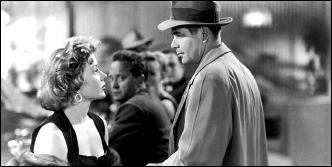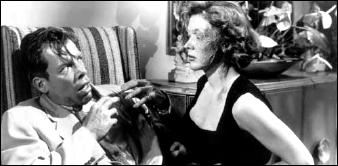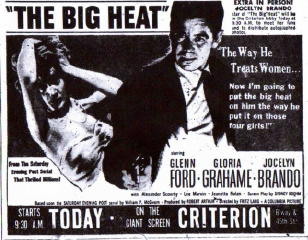Tue 21 Jan 2014
THE BIG HEAT. Columbia Pictures, 1953. Glenn Ford, Gloria Grahame, Jocelyn Brando, Alexander Scourby, Lee Marvin, Jeanette Nolan, Peter Whitney. Based on the novel by William P. McGivern. Director: Fritz Lang.

This one preceded Human Desire, which came out in 1954, with the same two stars (Ford and Grahame), the same director, and if you were to ask me which one I like better, I’m not sure I can tell you.
This is the one that’s freshest in my mind, however, so right now I’d probably give it the edge. While The Big Heat is not a movie without flaws, it has a lot of things going for it: atmosphere (crime and corruption in a big city), a plot that takes some interesting twists and turns, and some good performances, especially by Gloria Grahame as a gangster’s girl who dies in the end, with Glenn Ford playing the homicide detective who’s trying to run the city’s crime boss to earth.
Lee Marvin, in what must have been an early film for him, also makes a strong impression as the sadistic hoodlum who takes great pleasure in burning and tormenting women. Surprisingly, its Glenn Ford himself who seems rather innocuous and bland, as if to say there is nothing interesting to say about knights in white armor.

Villains, or at least those with pasts they are trying vaguely to shed (such as Gloria Grahame’s character) turn out, as often as not, to be the ones that stories revolve around. Ford’s character, while suffering a great deal of anguish and pain, as long as he’s as incorruptible as he is here, really doesn’t have anywhere else to go.

January 21st, 2014 at 4:45 pm
THE BIG HEAT has the single most callous line in the history of film noir as Ford’s character leaves the office on a call: “Keep the coffee hot.”
Considering what’s gone before…
I think the idea of the innocuous hero is how overmatched good seems against such colorful evil, but at the same time Ford’s righteous avenger will do anything, risk anyone, in pursuit of his goal His ruthless use of Grahame is a good example.
I think I like this a little better than HUMAN DESIRE only because I had seen the French version with Jean Gabin first and the American version imposes a more upbeat ending than LA BETE HUMANE.
But that last line, and from the innocuous good guy Ford always hit me as a thousand times tougher than “It was easy.”
January 21st, 2014 at 8:11 pm
I had some misgivings about posting this old review, which was written some 30 years ago. I don’t remember anything of the movie — nor of HUMAN DESIRE either, which apparently I had watched not long before this one — only what I wrote in the review itself.
This isn’t unusual for me, but I’m surprised that I don’t remember either Gloria Grahame or Lee Marvin’s performances, as each is a favorite of mine.
Luckily (as you see) the entire movie is available on YouTube. Now all I need is 90 minutes of free time to watch it.
January 22nd, 2014 at 4:59 am
Given Fritz Lang’s love of tortured psyches, I’m surprised he didn’t do a better job evoking some of the subversive aspects of Glenn Ford’s character. His handling of the Arthur Kennedy character in RANCHO NOTORIOUS (another embittered hero out to avenge a loved one)makes an interesting contrast.
As for Lee Marvin, this was one of the parts that made him such a memorable heavy and paved his way to stardom.
January 22nd, 2014 at 11:00 am
This is one of my two favorite Glenn ford movies (the other is 3:10 TO YUMA). But then I have a liking for “one just man” stories and films.
January 22nd, 2014 at 1:01 pm
Right. I don’t know why, but I have a feeling that I may like Glenn Ford in this movie a whole lot more now than when I watched it way back then for the first time.
January 22nd, 2014 at 4:36 pm
There is a sub current in this movie that runs through much of Lang’s work, and that is just how ruthless the ‘good’ man can be in dealing with evil. Ford’s character is in a direct line from Spencer Tracy in FURY, Walter Pidgeon in MAN HUNT, Brian Donlevy in HANGMEN ALSO DIE, Gary Cooper in CLOAK AND DAGGER, and Robert Young’s character in WESTERN UNION.
In each of those the good man hero acts more ruthlessly, regardless of who gets hurt on either side, than the villains to some extent. The theme seems to be that the hero must become the dragon to fight the dragon — something that dates back to a certain extent to Lang’s early work in THE SPIDERS, DR. MABUSE, and SPIES.
There is a scene in CLOAK AND DAGGER where Cooper kills a German agent that is the most brutal such scene until Hitchcock’s famous farm house scene in TORN CURTAIN. I think that applies to Ford in BIG HEAT, because by the end of the film he has come close to a monster himself in his single mindedness.
January 22nd, 2014 at 5:03 pm
In what way is Robert Young ruthless in Western Union?
January 23rd, 2014 at 2:50 pm
Young starts out as an effete Easterner, clearly a lightweight in all categories, but by the end of the film he’s become a tough track boss and gunfighter enough to avenge Scott. Much of the films theme is showing Scott as the good bad man swinging to the good side, and Young as the good man taking on aspects of the bad men in order to defeat them.
His journey isn’t as extreme as Ford’s in THE BIG HEAT, but it is a common theme in Lang’s work here after he escaped Nazi Germany, a not always subtle warning about what it would take to defeat such an enemy and the danger of losing the thing that made you better in the first place.
The golem film Lang planned with Brecht and supposedly to star Edward G. Robinson, would have been the ultimate expression of the theme with a good man creating a monster to avenge the evil done to his people.
January 23rd, 2014 at 3:21 pm
Young appears, almost as a send up of an effete easterner. He never is anything but effete. And in any case his growth does not represent a ruthless mind set. He evolves, somewhat. As he was from the beginning, an expert horseman. Scott is always good, although an outlaw. There is not a moment on screen in which Scott does not play the hero, as well as the romantic center. In any case, the ‘ruthless’ need not be applied.